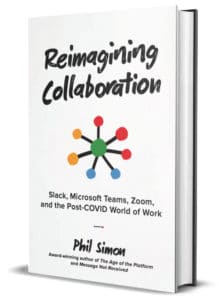 Interviewing the Interviewer
Interviewing the Interviewer
Ever since declining to re-up with ASU last May, I have said that I’d return to academia on a full-time basis, but only under the right circumstances.1 To that end, this past July I interviewed for a position as a full-time college professor at a midsized university closer to my roots back east.
The timing here is important. In other words, in a little more than one month, a brand-new professor would have to teach four sections of a key prep. Put mildly, the hiring committee was under the gun to quickly fill the slot.2
After making the initial cut, I proceeded to the next step: a full day of Zoom interviews and a presentation to demonstrate my teaching skills. During the former, I made sure to ask each of my would-be future colleagues a simple question: Which applications did they use to communicate and collaborate with each other and their students?
To a person, they all responded with, “E-mail.” Even over Zoom, their tone and body language were unmistakeably quizzical: What else would you use? There are other, maybe even better communication and collaboration options?
The Method to My Madness
 I’m not completely oblivious. Reading the (virtual) room, I could tell that my straightforward query had rattled a few of the interviewers. As we chatted, I explained that I have long communicated just fine with students sans e-mail.
I’m not completely oblivious. Reading the (virtual) room, I could tell that my straightforward query had rattled a few of the interviewers. As we chatted, I explained that I have long communicated just fine with students sans e-mail.
Huh?
I wasn’t advocating some insane experiment or unsafe/unproven e-mail alternative. Rather, I had successfully used Slack in the classroom in my years at ASU as a collaboration hub. That is, I did far more with it than just send and receive text messages. I even wrote a book about the power of internal collaboration hubs. Brass tacks: I wasn’t interested in reverting to e-mail and a world without hubs and spokes.
Now, I’m no absolutist. Say that, at this university, Slack was off the table for whatever reason. No bother. Today, I happily use Microsoft Teams, Zoom, and Google Workspace in similar ways because I like to stay current. Even prior to COVID-19, internal collaboration hubs were becoming more powerful, popular, and important. Individual differences between and among them are waning because software vendors so frequently, er, borrow from each other. As educators, wasn’t it our responsibility to provide students with the skills they need to succeed when they graduate?
You probably see where this little yarn is going.
Microsoft Teams daily active users as of April, 2021.
Million
Educators who refuse to learn new tools and methods fail their students.
I harbored no illusions, however. I knew that my query and the discussions it provoked were risky gambits. Even though they effectively ended my candidacy, I lost zero sleep over the decision.
The interviewers’ universal unwillingness to even consider using new, superior collaboration tools represented to me the reddest of flags. The message couldn’t have been clearer: We don’t want outsiders introducing new ideas into our ivory tower. The words rigid and hidebound come to mind.
Thank You for Your Interest …
A few days later, I received the inevitable, canned rejection e-mail—followed by a second one a few days later. The redundant e-mail made me even more confident of my assessment of the school. (Bayes’ theorem in action, baby.)
Reading between the lines, it was obvious that this century-old university:
- Continues to struggle with technology, systems, and change.
- Doesn’t recognize these problems.
- Would view people like me as intransigent threats to established norms and the powers-that-be.
Simon Says
I’ll place my reactions into two buckets. First, ultimately the students will suffer for this unfortunate mind-set. Whoever teaches those courses will fail to expose the class to critical applications used by hundreds of millions of people. (Yes, a little piece of me has just died inside.) How can professors expect students to learn new skills, tools, and concepts if they themselves refuse? Professors need to lead by example.
Second and on a personal level, I don’t regret discussing collaboration during the interview process one bit. As I’ve aged and attained some level of success, I’ve become intentionally and unapologetically picky about professional opportunities. Double that when they require me to quickly uproot my life and move across the country. Certain things I just won’t abide. Relying upon antiquated communication and collaboration methods sits at the top of my list.
As an aside, I know that writing a post like this will make me radioactive to employees at a certain type of organization. To that, I say, “Good.”
Which traits disqualifies employers when you’re searching for new opportunities?

 PHIL SIMON
PHIL SIMON


0 Comments